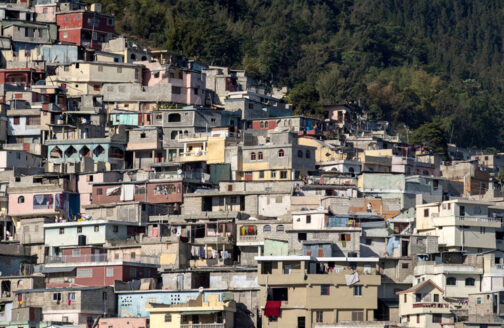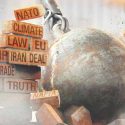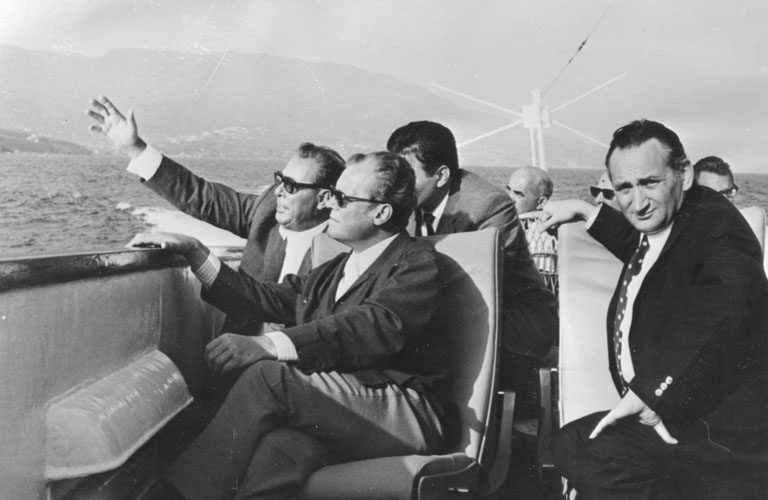Enough!
 Steep decline: Jalousie district of Port-au-Prince, Haiti.
Steep decline: Jalousie district of Port-au-Prince, Haiti.Credit: picture alliance / REUTERS | Ricardo Arduengo
A chance for the international community to practice its preaching
The international community has a brief but historic opportunity to support a watershed change in Haiti that would restore democratic, rules-based governance. The opportunity stems from two recent failures: of Haiti’s corrupt, repressive government, which now lacks a single elected official, and of efforts by powerful international community actors to prop up the government through military intervention. The window of opportunity is not wide – and failure to act immediately risks Haiti’s descent into deeper crisis.
The terms of the last of Haiti’s remaining elected officials – ten senators – ended on Jan. 9. All elected positions are now vacant or filled by unconstitutional appointees, with no elections scheduled. This moment has been a long time coming. These final senators had been unable to actually legislate since January 2020, when the terms of most of their parliamentary colleagues expired. When the terms of Haiti’s elected mayors and other local officials expired in July 2020, the government illegally appointed replacements. The term of the last president, Jovenel Moïse, had expired by most accounts in February 2021, though he remained in office until his assassination the following July. Supreme Court vacancies – some resulting from the unconstitutional removal of justices – deprive that body of a quorum.
Since August 2021, Haiti has been led by de facto Prime Minister Ariel Henry. Henry ascended to power not through a constitutional mechanism, but via an announcement by the Core Group – comprising foreign governments and inter-governmental organizations, including the EU, Germany, France, Spain and the US. A prosecutor subsequently implicated Henry in President Moïse’s assassination, but the PM deflected the accusation by firing the prosecutor. Neither Henry nor anyone else has been formally charged in Haiti for the president’s murder.
Haiti’s democracy has suffered frequent starts and stops since the 1986 departure of President Jean-Claude “Baby Doc” Duvalier. The largest previous stops came from military coups that overthrew elected President Jean-Bertrand Aristide in 1991 and again in 2004. The current crisis, by some measures a new low, is the culmination of twelve years of tenacious power accumulation by a movement centered around the ruling Parti haïtien Tèt Kale party (PHTK). The PHTK has persistently dismantled accountability mechanisms since it won contested elections in 2011. In addition to neutralizing Parliament and the courts, the PHTK has avoided electoral accountability by never running an election that was timely or fair – and no elections whatsoever since 2016. It has packed the public service with loyalists, especially the police and judiciary. The PHTK has also cowed the press. Eight journalists were killed in Haiti in 2022 – more than anywhere else except Ukraine and Mexico – including Romelo Vilsaint, who was murdered in October by police who opened fire at journalists protesting the illegal detention of another journalist arrested while covering a previous protest.
As is widely reported, the Haitian people are now under siege by armed gangs that by some estimates control over half the country. The causes of the scale of this violence and corruption are complex, and include the hospitable environment created by the PHTK’s undermining of the police and justice systems. Furthermore, direct PHTK support has been critical to the dissolution of the rule of law: Harvard Law School and Haitian Human Rights organizations have established that PHTK officials’ collaboration with gangs on deadly attacks against dissidents was widespread and political enough to constitute crimes against humanity.
Even the police, stacked with PHTK loyalists, appear to have lost patience with PHTK support for the gangs. On Jan. 27, police officers enraged by the gang execution of seven of their colleagues one day earlier attacked the prime minister’s residence. When they discovered Dr. Henry was not at home but rather in an airplane preparing to land at the airport, the police invaded that facility. No one was hurt, but the attack generated panic and forced international flights to divert from Haiti and the prime minister to flee through a back door.
Dismantling accountability systems has facilitated spectacular PHTK corruption, including an estimated $2 billion stolen or misspent from Venezuela’s Petro-Caribe aid program. The government’s looting of the treasury and consequent deficit spending generated inflation that dwarfs the price increases stemming from the war in Ukraine. Haiti’s inflation has exceeded 15% each year since 2019, and hit 47% for the month of October 2022. GDP has not grown since 2018. Over a third of all Haitians face a severe food crisis, and in October, the UN reported that Level 5 (“catastrophic”) hunger has been reached in Haiti for the first time.
The PHTK’s economic misery, corruption and repression have generated massive opposition, which reached critical levels of intensity last year. Formal civil society groups – civic, business, labor, peasant, religious – courageously denounce the government and convene persistently to propose alternatives. Grassroots groups organize massive protests that periodically shut the country down, sometimes for days. As the most concerted, and threatening, protests to date surged nationwide last fall, the PHTK government requested on Oct. 7 that the UN “authorize the immediate deployment of a specialized armed force.”
The international community has supported the PHTK since party founder Michel Martelly was elected president in controversial 2011 elections. Powerful actors found President Martelly and his successors easy to work with. The PHTK leaders supported MINUSTAH, the UN Peacekeeping mission from 2004–2017, even defending it against claims from the victims of the cholera epidemic introduced by the reckless disposal of peacekeepers’ human waste. The PHTK complied with requirements from the IMF and other international financial institutions (IFI), including a controversial termination of fuel subsidies. The party refrained from the kind of provocative demands on the international community that its more leftward predecessors made, such as calling for restitution of Haiti’s independence debt to France and pushing back on IFI austerity measures.
The keystone of current international support to Haiti’s government is an insistence that any solution to the crisis include the PHTK. This insistence is anathema to many Haitians, who struggle to understand how a political movement that has worked so assiduously for unaccountable power could or should be part of a return to a rules-based governance. But opposition leaders also fear that Core Group members are likely to scuttle any solution that does not meet their conditions.
International community support for the de facto government has also included enthusiastically backing the request for international troops. But that process may have run out of steam. In October, UN Secretary-General Antonio Guterres quickly endorsed the request. The US introduced an authorizing resolution to the Security Council and Canada reached out to other countries for troops. But four months later, the resolution had yet to even a vote. At the Jan. 24 UN Security Council meeting on Haiti, Guterres and others continued to support the mission, but Canada’s UN Ambassador Bob Rae appeared to put aside the idea of a specialized armed force, “pointing to the history of large military interventions in Haiti that have failed to bring about long-term stability for Haitians, and emphasizing that all solutions must be Haitian-led and Haitian-owned to ensure a sustainable impact.”
Security Council dynamics, further complicated by the war in Ukraine, have always posed a challenge to the approval of military intervention, but in this case, the more fundamental problem was that Haitians themselves opposed it. Although many exasperated Haitians believe that international troops are the only possible solution, the vast majority of political parties, civil society organizations and protesters in the streets have rejected them as yet another case of the international community propping up their hated government. Haitians also echo Ambassador Rae’s humility about international troops, pointing to the experience of MINUSTAH, which spent 13 years and $7 billion without making substantial improvements to their lives.
Haitian opposition, and the specter of peacekeepers fighting the people they were sent to help, left Canada and the US unwilling to lead the intervention, so they sought a country from Latin America or Africa to take on the challenge. After some initial optimism, no country has stepped forward to help. As Ralph Gonsalves, Prime Minister of Saint Vincent and the Grenadines noted: “I don’t want anybody to interpret us as going to send the police there to help to prop up the government, which so many people are contending inside of Haiti doesn’t possess legitimacy.”
With intervention looking unlikely, the international community is now placing its eggs in the basket of the December 21 National Consensus for an Inclusive Transition and Fair Elections, the latest in a series of political accords proposed by the government to counter more popular civil society accords. The December 21 Accord does contain promising language on building consensus, fighting insecurity and moving towards elections, but it does not actually share any of the government’s existing power, and it would keep the de facto prime minister in office for at least another year.
Haitians immediately rejected the accord. Although the government claims that the accord has over 500 signatories, Haitians note that this does not include a single party that exceeded 1% of the vote in the last presidential election. Many listed signatories deny they actually signed it.
Haitians are especially upset that the accord provides the PHTK even more opportunities to consolidate power. It would grant the de facto government unconstitutional authority to pack both the Supreme Court and the Electoral Council, which would project PHTK influence for more than a decade. The accord would also renew the PHTK’s efforts to amend the constitution through a plebiscite. Jean-Claude Duvalier used rigged plebiscites to amass power, so the constitution, written shortly after Baby Doc’s departure, expressly prohibits plebiscites to prevent exactly this kind of power grab.
Regrettably, the accord’s unpopularity in Haiti is matched by enthusiasm abroad. The EU “welcomed it with interest.” The UN mission in Haiti told the Security Council that “the agreement, whose adherents are growing every day, is indeed the most promising sign to emerge from dialogue efforts until now.”
Haitians do not want the international community’s soldiers or interference any more than powerful countries would want it in their territory or in that of their neighbors. Haitians want the international community to respect the rules it insists that others respect, and allow Haiti the sovereignty and democracy that those rules guarantee.
Taking the rules-based international order seriously would mean the international community ceasing to prop up Haiti’s repressive, unconstitutional government. De facto Prime Minister Henry and the PHTK are rationally playing the cards in their hand, and will continue doing so until the game changes. They cannot win a fair election, so they have no incentive to make any compromises that might oblige them to organize one. The PHTK supporting fair elections, after 12 years of building power by refusing them, would be like the leopard changing its spots – and also pulling out its own teeth and claws. As long as the international community keeps propping up the PHTK, there will be no cost, and much benefit, to intransigence.
Ambassador Rae’s acknowledgement of past mistakes is a good start. So are sanctions that Canada, the US and Switzerland have been imposing since October, many of them targeting top former PHTK leaders. But none of this will make a difference unless the international community addresses the nut of the problem in Haiti: its propping up the PHTK through the effective veto on negotiations.
Oddly enough, the widespread opposition to the de facto regime in Haiti – and distrust of the international community – underscores the opportunity for Haiti to get back on the democracy path. Haitians are coming together, across party, class and other lines that often frustrate collaboration, because PHTK misrule has demonstrated that the existence of democracy itself is more important than their previous disagreements about how democratic power is obtained and exercised. Haitians who might have looked abroad for help are now convinced that only Haitians can get their democracy back. If the international community is serious about a rules-based international order, let’s give them a chance to succeed while there’s still time.
Brian Concannon is executive director of the US-based Institute for Justice & Democracy in Haiti




